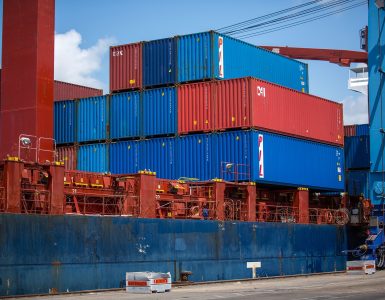Arizona’s economy has expanded immensely under an open trade agreement between the U.S., Mexico and Canada for the past 25 years, and is poised to do even better under a new modernized version, according to a new report released today.
Now is time for Congress to move swiftly to ratify the new version that is vital for Arizona to sustain its relationship with its trading partners, states a policy brief commissioned by the non-profit Arizona Chamber Foundation, the Arizona Chamber of Commerce and Industry, and Arizona-Mexico Commission.
“The latest trade figures tell the story of a state with an economy that is deeply integrated across international borders,” Arizona Chamber Foundation CEO Emily Anne Gullickson said. “The adoption of the USCMA will build on Arizona’s already-outstanding environment for business and will attract more investment in our state, creating new jobs and prosperity.”
Between 2015-2017 alone, Mexico and Canada purchased $10.5 billion in Arizona exports, which is twice the combined value of the state’s next eight-highest export markets.
The research brief was commissioned to provide Arizona businesses and decision-makers with an overview of the benefits and key changes in the new agreement, the United States-Mexico-Canada Agreement (USMCA). If Congress approves it, it would replace the North American Free Trade Agreement (NAFTA) that has governed open trade between the three countries since 1994.
Ratification of the new deal, however, is not a sure thing. While all three leaders signed off on it, their top legislative bodies have final approval. Mexico and Canada officials are holding off until the U.S. acts.
The longer Congress waits, the more likely the deal could face headwinds, the report said.
“The longer the ratification process in the United States stretches out, the more objections and requests for changes to the agreement will begin to gain ground not just in the U.S., but also in Canada and Mexico,” the brief states.
As a border state, Arizona would face significant economic instability if the highly integrated trade relationship is fractured. Arizona is ranked ninth among states that would suffer the most if the U.S. withdraws from NAFTA, according to the U.S. Chamber of Commerce.
Without the deal, tariffs put into place last year and resulting inconsistent standards could put tens of thousands of Arizona jobs at risk, the policy report states.
“More than 228,000 Arizona jobs are dependent on trade with Canada and Mexico,” Arizona-Mexico Commission President Jessica Pacheco said. “The USMCA’s modernized provisions in areas like agricultural market access, digital trade, and the automotive sector will enhance Arizona’s ability to compete globally. Arizona’s relationship with Mexico is a model for North American collaboration. Adoption of the USMCA makes a good thing even better.”
Historic open trade agreement benefits state
NAFTA has made it easier for Arizona to attract investment from Mexico and Canada and grow a range of export- and import-oriented industries including electronics, agricultural goods, mining, machinery, logistics and services.
Arizona agriculture exports nearly $800 million of goods to Canada and Mexico every year. Regional companies alone in metropolitan Phoenix saw exports grow from $1.7 billion to $4.9 billion from 2015-2017, the U.S. Department of Commerce reports.
Other benefits include more than 236,000 jobs in Arizona due to trade and investment with Mexico and Canada. Millions of shoppers and tourists visit each year from the two countries. Canada provides tremendous direct foreign investment. Today, more than 300 Arizona-based firms are owned by Canadian companies like Bombardier, Inc., Circle K, Stantec, UNS Energy Corp., Fairmont Hotels, Freeport-McMoRan Inc., Kahala Brands, OpenText Corp., and EPCOR Water.
New and improved USMCA changes
The USMCA’s stated purpose is to deepen gains from trade and preserve and expand regional trade and production by further “incentivizing the production and sourcing of goods and materials in the region.”
Changes to the new agreement include:
New Rules of Origin More stringent rules from the automotive industry. Seventy-five percent of vehicles, including electric vehicles, would have to be produced in North America instead of the current 62.5 percent, and 40-45 percent of vehicles would be assembled by workers who earn at least $16 an hour.
These new rules could benefit Arizona, tilting automotive original equipment manufacturers (OEMs) toward the southern part of the United States and Mexico.
Arizona is well positioned, given its proximity to OEMs in Northwest Mexico like Ford in Sonora, and Toyota in Baja California, and its connectivity via I-19 to Mexico’s Highway 15 corridor, leading to the Bajío automotive cluster. Binational electrical vehicle projects, such as the proposed Lucid Motors factory planned for Pinal County, also would be well positioned to meet USMCA goals and leverage research and development and auto assembly in the U.S.
Agricultural access The agreement preserves market access for Arizona’s agricultural industry and includes additional U.S. access to Canada’s poultry, dairy and wine markets. There are additional measures to improve phytosanitary inspections.
Higher duty-free thresholds Minimum thresholds would be increased, removing tariffs on more goods. This should allow for some additional flexibility in sourcing globally while also keeping the duty-free incentive to source in North America. This also would have a positive impact on the SkyBridge initiative at Phoenix-Mesa Gateway Airport, a new operation that capitalizes on the U.S.-Mexico Unified Cargo Processing that expedites import and export processing times of goods.
Stronger IP protections New protections for intellectual property would extend patent protections to 10 years from eight in Canada, expand copyright protections, and broaden trademark rules to cover sound marks and scent marks. Penalties would increase for violating trade secrets or trading counterfeit goods. Custom rules for detaining illegal counterfeit goods would be modified. Internet service providers would be required to implement a “notice and takedown” system in Mexico when digital information infringes on ownership rights.
Digital Trade & Cybersecurity New provisions for digital trade such as e-books, music, software and video games include a prohibition on tariffs on digital products distributed electronically, rules for validating e-signature and e-documents, anti-spam measures, and coordinated cybersecurity measures for the three countries’ highly integrated telecommunication systems.
What’s Next?
The Trump administration is working to build congressional support for the modernized agreement. The goal is to have it approved by this summer. Meanwhile, Trump has made rumblings that he may withdraw from NAFTA to force Congress to approve the new pact.
Without NAFTA and the USMCA, that could undermine infrastructure investments spurred on by Arizona’s trade and tourism with Mexico like the $244 million expansion of the Mariposa Point of Entry (POE) in Nogales, the $6 million pedestrian facility modernization at the San Luis POE, improvements for the Raúl H. Castro POE in Douglas, or the new SkyBridge-Arizona international air cargo hub.
“This paper makes clear not only that trade benefits Arizona greatly, but that the USMCA is a modern trade agreement for the 21st century economy,” Arizona Chamber of Commerce and Industry President and CEO Glenn Hamer said. “The Arizona business community is pleased to join Gov. Ducey in calling for the swift ratification of the USMCA. Let’s take advantage of all that the USMCA has to offer and launch Arizona into even more robust growth in the years ahead.”
Ratification is essential to attract future investment and offset potential competitive and other emerging global trade blocs, the policy brief states.
The policy brief, “The USMCA and its Impact on Arizona,” was developed by the North American Research Partnership and Crossborder Group. To read the full brief, click here.
















Add comment